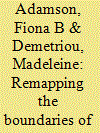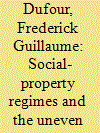| Srl | Item |
| 1 |
ID:
079903


|
|
|
|
|
| Publication |
2007.
|
| Summary/Abstract |
Irredentism developed into an anomaly in post-World War II Europe and - contradicting the dire predictions of the 1990s - has remained an anomaly even since the end of the Cold War. Focusing on the renunciation of the FRG's and the Republic of Ireland's irredentist claims, I propose a novel route to analyse dispute settlement. I contend that nations justify their stance in a conflict. In the case of irredentism, they do not merely assert that a disputed territory is their land but justify to themselves and others why the disputed territory is rightfully theirs and why pursuing the irredentist stance is worthwhile. The disruption of this justification - what I call dejustification - constitutes a pathway to dispute settlement. Dejustification occurs through a change of the ideational environment that serves as the resource for justifying the claim and an advocacy that constructs a mismatch between environment and claim
|
|
|
|
|
|
|
|
|
|
|
|
|
|
|
|
| 2 |
ID:
079905


|
|
|
|
|
| Publication |
2007.
|
| Summary/Abstract |
While evidence continues to mount that democracies resort to military force reluctantly, the transition to democracy may in fact be a dangerous and conflictual one. Given the emphasis now being put on democratization, a reassessment of the relationship between the stability of domestic institutions and interstate conflict seems fitting. To date, the evidence remains mixed. No clear consensus has emerged on whether regime transition either increases or decreases conflict propensities. Employing a logit specification with splines and robust standard errors, this research analyzes the conflict behavior of transitioning states for the 1950-2000 period. The results indicate that `rocky' transitions or democratic reversals increase the likelihood of conflict occurrence. I demonstrate, however, that this result is driven by the conflict behavior of autocratizing countries. An interaction term shows that although regime change itself may increase conflict propensities, such exacerbating effects are reversed for democratizing states.
|
|
|
|
|
|
|
|
|
|
|
|
|
|
|
|
| 3 |
ID:
079906


|
|
|
|
|
| Publication |
2007.
|
| Summary/Abstract |
Can interventions be used to assist oppressed peoples in overthrowing their governments? According to the influential non-interventionist arguments of J.S. Mill and Michael Walzer, reform interventions are incompatible with a principle of national self-determination. This article challenges Mill and Walzer, arguing that, in limited cases, interventions could in principle support revolutionary movements in such a way as to facilitate democratic transition. It does so by tracing a lack of conceptual clarity back to Mill's argument in `A Few Words on Non-Intervention'. In particular, it is argued that Mill's and consequently Walzer's account of domestic revolutionary conflicts fails to distinguish the salience of military from properly political forces. Mill's Considerations on Representative Government provides the starting point for a clearer set of distinctions through which to reconstruct the principle of non-intervention on a stronger footing
|
|
|
|
|
|
|
|
|
|
|
|
|
|
|
|
| 4 |
ID:
079904


|
|
|
|
|
| Publication |
2007.
|
| Summary/Abstract |
The structural components of a state are regularly conflated with a state's national identity. In reality, however, the assumption that the boundaries of a state and its national identity are coterminous is problematic. While this has always been the case, changes in the ability of actors in the international system to use communication and transportation technologies to sustain transnational collective identities points to the need for new empirical research in this area. Contemporary diasporas are defined by a national or cultural identity, yet differ from nation-states in terms of their organizational and spatial logics. By comparing diaspora mobilization in two cases, we find that both non-state political entrepreneurs and state elites are using diasporic practices of identity formation as a means of generating economic and political support in an increasingly integrated global economy. This points to discontinuities between a territorially defined states system and deterritorialized practices of collective identity formation.
|
|
|
|
|
|
|
|
|
|
|
|
|
|
|
|
| 5 |
ID:
079907


|
|
|
|
|
| Publication |
2007.
|
| Summary/Abstract |
Concepts like `nation', `society', and `culture' name bits and threaten to turn names into things. Only by understanding these names as bundles of relationships, and by placing them back into the field from which they were abstracted, can we hope to avoid misleading inferences and increase our share of understanding. (Wolf, 1997: 3)
Theories of International Relations have often shied away from apprehending the historicity of modern nationalism. Inversely, theories of nationalism have not spent much time theorizing the inter-national. The analysis of the relationships among social relations, international orders and nationalism has fallen in the cracks between the field of IR and the field of comparative nationalism. In the context of a renewal of interest for the historical sociology of the international, the analysis of these relations remains of particular relevance. In this article, the author builds on Benno Teschke, Justin Rosenberg and Hannes Lacher's theorization of modern sovereignty, capitalism and the uneven and combined development of International Relations to recast the socio-historical conditions of emergence and diffusion of the modern national form
|
|
|
|
|
|
|
|
|
|
|
|
|
|
|
|